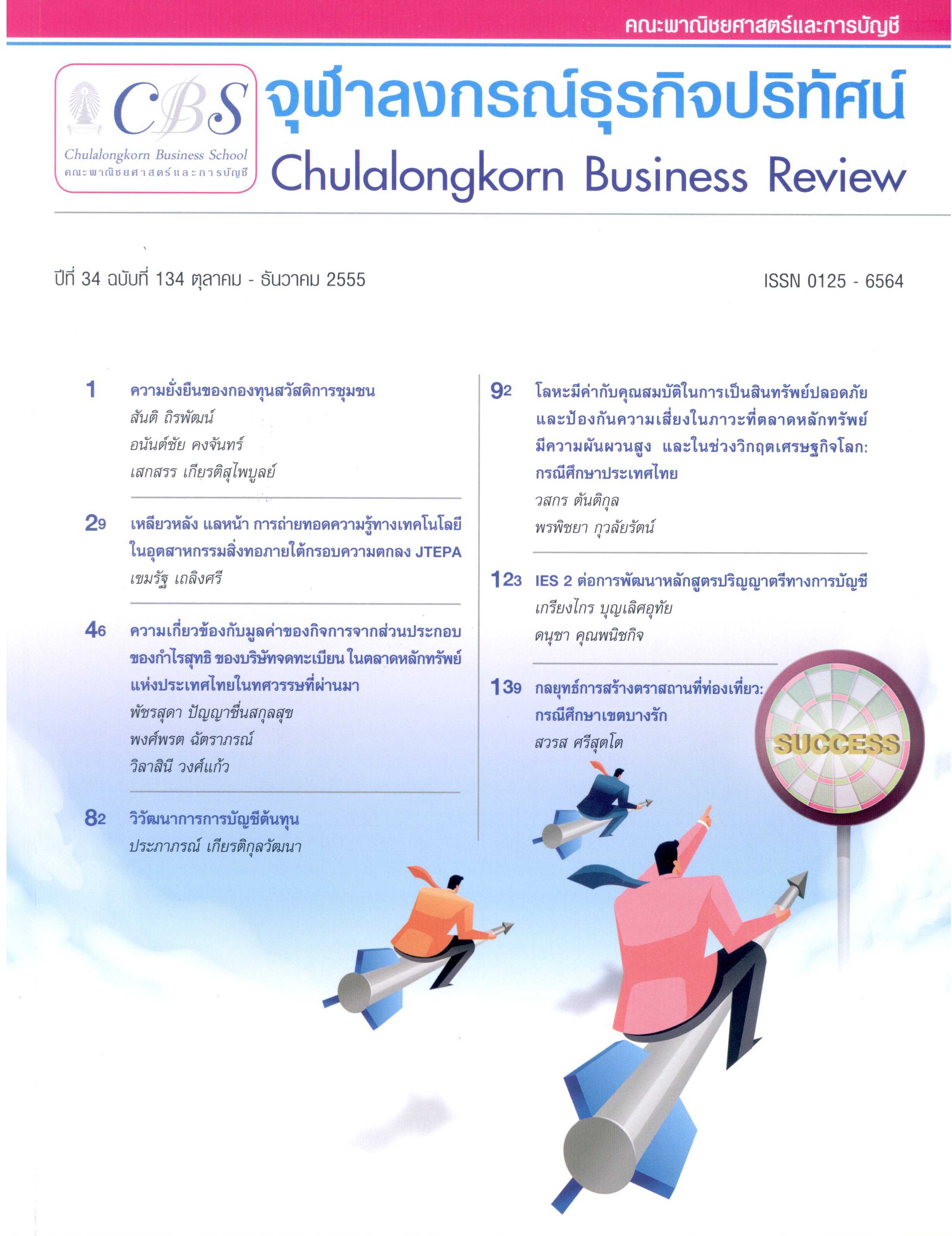เหลียวหลัง แลหน้า การถ่ายทอดความรู้ทางเทคโนโลยีในอุตสาหกรรมสิ่งทอภายใต้กรอบความตกลง JTEPA
Main Article Content
Abstract
ความตกลงหุ้นส่วนเศรษฐกิจไทย-ญี่ปุ่น (JTEPA) ซึ่งมีผลบังคับใช้มาตั้งแต่ปี 2550 กำหนดกรอบความร่วมมือทางด้านสิ่งทอและเครื่องนุ่งห่มระหว่างอุตสาหกรรมในทั้งสองประเทศ ซึ่งหนึ่งในวัตถุประสงค์คือ เพื่อเพิ่มความสามารถทางเทคโนโลยีของฝ่ายไทยผ่านการถ่ายทอดความรู้ทางเทคโนโลยีและการจัดการจากผู้เชี่ยวชาญจากภาคอุตสาหกรรมสิ่งทอและเครื่องนุ่งห่มของญี่ปุ่น อย่างไรก็ดี การถ่ายทอดความรู้ทางเทคโนโลยีที่จะนำไปสู่การพัฒนาความสามารถทางเทคโนโลยีของผู้รับการถ่ายทอดได้จริงไม่ใช่เรื่องง่าย โดยเฉพาะอย่างยิ่ง หากเทคโนโลยีนั้นมีองค์ประกอบของความรู้ซ่อนเร้น (Tacit Knowledge) ที่ขึ้นกับประสบการณ์และฝังอยู่ในตัวบุคคลหรือองค์กรเจ้าของความรู้และเทคโนโลยี มากกว่าความรู้เด่นชัด (Explicit Knowledge) ที่เป็นข้อเท็จจริงปรากฏตามเอกสารต่างๆ การถ่ายทอดความรู้ทางเทคโนโลยีลักษณะนี้จำเป็นต้องมีขั้นตอนการแปลงและถ่ายทอดความรู้ที่ชัดเจนเป็นระบบและเป็นรูปธรรม บทความฉบับนี้ ต้องการนำเสนอปัจจัยที่กำหนดความสำเร็จของการถ่ายทอด ประเด็นปัญหาที่เกิดขึ้นในการถ่ายทอดความรู้ทางเทคโนโลยีในภาคอุตสาหกรรมสิ่งทอและเครื่องนุ่งห่มของไทย และนำเสนอตัวอย่างขั้นตอนการแปลงความรู้ซ่อนเร้นของเจ้าของเทคโนโลยีเป็นความรู้ซ่อนเร้นของผู้รับเทคโนโลยี ซึ่งเป็นประเด็นที่ภาคเอกชนไทยควรจะให้ความสำคัญอย่างจริงจังเพื่อนำไปสู่การเก็บเกี่ยวผลประโยชน์จากกรอบความร่วมมือในความตกลง JTEPA ให้ได้มากที่สุด
คำสำคัญ: การถ่ายทอดเทคโนโลยี ความรู้ซ่อนเร้น ความตกลงหุ้นส่วนเศรษฐกิจไทย-ญีปุ่น โครงการความร่วมมือด้านอุตสาหกรรมสิ่งทอ และเครื่องนุ่งห่ม
Abstract
“The Cooperative Project in the Textile and Garment Industry” is one of the components in Japan-Thailand Economic Partnership Agreement (JTEPA) which has come into effect since November 2007. It partly aims to enhance technological capability of Thai textile sector through means of knowledge transfer. However, such goal may seem far-fetched if the recipient of the technological knowledge does not know how to facilitate the transfer and lacks commitment to absorb the transferred knowledge. This issue is made particular harder if the knowledge we aim for is tacit in nature. To transform tacit knowledge between two parties requires systematic mechanism and high level of commitment from both. This article aims to provide overview of channels of technological knowledge transfer commonly chosen by Thai textile firms, problems they have been facing as recipients of technology. An example of systematic mechanism of transfer is highlighted such that lessons can be drawn for the Thai textile sector so as to maximize benefit from this cooperation chapter.
Keywords: Technology Transfer; Tacit Knowledge; Japan-Thailand Economic Partnership Agreement (JTEPA); Cooperative Project in the Textile and Garment Industry
Article Details
Opinions and discussions in papers published by the Creative Business and Sustainability Journal (CBSJ) are deemed as personal opinions and the responsibility of the writers. They are not the opinions or responsibility of the Chulalongkorn Business School of Chulalongkorn University.
Papers, content, information etc. appearing in the Journal are deemed to be the copyright property of the Chulalongkorn Business School of Chulalongkorn University. Anybody or any organization that wishes to publish any part of them or use them in any way must obtain written permission from the Chulalongkorn Business School, Chulalongkorn University.


